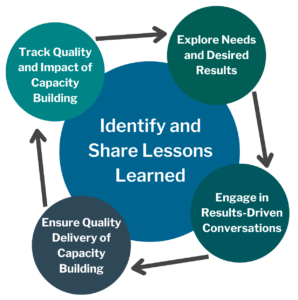
Guiding Principles
Focus on Desired Results
- Any capacity building effort should be directly linked to the overall goals that are held by the partner(s) with whom we are working.
- The focus should combine skill building, knowledge development, and strengthened relationships to support participants in acting on their stated goals.
- The central question is: Did this effort have the desired impact, and did it contribute to the partner(s) achieving the outcomes they want for their work?
Explore the Need
- The engagement should derive from the partner’s desires, needs, and goals, and be tailored to the specific needs and contexts of the organization or community requesting support.
- Flexibility to exchange ideas and share previous experience and expertise helps to produce a range of options about what is possible, utilizes the experience and expertise of CSSP staff, and allows for collective agreement about what might work best.
Co-Design the Engagement
- Co-design means working together with partners to clarify goals and priorities, understand the context and local environment, and jointly develop a timeline and strategy that will produce the desired outcomes with shared expectations and responsibilities.
Reflect the Expertise of those Impacted
- Facilitate the involvement of those most likely to be impacted by the engagement ensures that all voices are included in a way that is collaborative, improves relationships, and reflects individual’s viewpoints and insights. This leads to greater buy-in to the process, and ultimately to better experiences, and results, for all involved.
Center Equity, Intersectionality, and Justice
- An analysis of how race, class, culture, language, gender, power, and privilege impact the work being done is critical to the success of any capacity building engagement.
- CSSP rigorously employs an anti-racist intersectional frame in understanding the need, co-designing anti-racist solution(s), and in shaping the capacity building process with partners.
Focus on Both Adaptive and Technical Challenges
- The issues facing organizations and communities striving to improve outcomes for children and families can be straightforward with an easily identified solution. When a challenge is straightforward, and a technical “fix” can be found, capacity building can help in the selection and implementation of a known solution.
- Often, issues are complex, without an easily identified solution or, where there are no clear choices among the possible options. When challenges are more complex and harder to easily address, effective capacity building can help to tease out the issues at play, and develop solutions that require more flexibility, understanding, and adaptation.
Draw on Existing Data and Lived Experience
- CSSP values the use of data to help understand our partner’s work: what is driving the need to learn, what is happening in the current community or organizational context, and what data is available to create measurable outcomes.
- There are multiple sources of data – which include both quantitative and qualitative (such as stories, visual aids, art, oral histories, etc.) types of data, all of which are critical to help partners make informed decisions about goals and strategies, and should be used to select, apply, and evaluate technical assistance efforts.
- Effective, results-based capacity building should combine the best available evidence of what works, including practice-based research and work that is informed by the lived experiences of those impacted to ensure the proposed work is a good fit for the recipient, and is customized and adaptable to the recipients’ context.
- In many cases the most effective solutions don’t yet exist, particularly when crafting an anti-racist response.
Support How Adults Learn
- Research shows that adults learn in ways that include experiencing a mix of learning modalities, including: time and space to reflect; time to practice and apply what they’ve learned; use of repetition; and learning in ways that are relevant for their work. Adult learning is also enhanced when the environment is supportive.
- Effective capacity building employs a variety of strategies to ensure what is learned is absorbed and maintained. The approach outlined in moving groups from talk to action used in Results-Based Facilitation is often helpful in designing workshops and conversations.
Our Offerings
Skill and Knowledge Building Trainings
- CSSP offers several specialized learning opportunities, which are customized in partnership with local communities and organizations and include facilitation and training on concepts of race, ethnicity, and sexual orientation, gender identity, and expression (SOGIE), and using an anti-racist intersectional frame when addressing challenges and co-designing solutions. These include:
- Results-Based Facilitation Skills
- inSIGHT: A Workshop on Implicit Racial Bias for Child Protection
- Racial Equity and Justice Core Terms and Concepts
- History of Racism in Child Welfare
- Youth Thrive Trainings
- Strengthening Families Trainings
Organizational Assessment
- Ensuring a partner is ready to engage in the capacity building effort is a key consideration. To best assess this, CSSP may ask a variety of questions of leadership and staff to better understand their commitment, the resources available, the time and capacity they can dedicate, and whether their goals are realistic. Once an agreement about a scope of work is made, an organizational assessment could be a part of the work and may include the design and analysis of a baseline survey of an organization’s staff capacity, knowledge, and skills on a variety of topics, usually with a focus on racial equity and justice. CSSP has developed several assessment tools that can be utilized and/or adapted to a particular need and organizational context, including a Race Equity Impact Assessment Tool designed to assess the impact of policy and practice; Strengthening Families Program Assessment to assess best practices to support young children; an Early Childhood Performance Assessment Toolkit to assess how well an early childhood system is working; a Guide for Anti-Racist Data Collection to support caseworkers and front-line staff, and many other tools and resources. CSSP has also developed a more intensive qualitative assessment called the Institutional Analysis, which identifies how institutions may not be working as effectively as they can for families, particularly families of color.
Leadership Development and Coaching
- This is typically one-on-one or small group, focused on building/enhancing the skills and capacity of anyone in a leadership role (broadly defined) who is seeking support in their role. It is primarily offered to leaders and teams who seek to develop their leadership, emotional intelligence, and effectiveness skills that will better equip them to lead toward adaptive results, and equity focused efforts within their organization or community.
Strategy and Implementation Consultation
- This can be short-term or ongoing consultation with content and/or process experts, peers, and partners to work through an issue, design a program or solution, and build capacity to solve problems. This can include content specific information; policy and program strategy and implementation; data collection strategies; development of performance measures; insight from strategic partners; leveraging of resources or the application of best practices.
Meeting Design and Facilitation
- We believe that people need the time, space, and opportunity to work and think together to surface their own expertise and ideas to come to agreement about solutions to challenges they are facing. Results-based meeting design and results-based facilitation can provide groups with a neutral facilitator who can help shape a conversation designed to elicit clear results.
Research and Information Scans
- This involves the use of content experts to support specific topics, best practices, research findings, and/or evidence-based programs, and strategies. It often results in the production of a document, which can either be simply shared with the requesting party or can be part of a formal presentation or event with multiple stakeholders.
Large Group Convenings
- One powerful way to build and strengthen relationships, share information and best practices, and provide new knowledge and skills is through convening larger groups who can work towards a shared set of outcomes. Using the same skills involved in results-based meeting design and facilitation, convenings are organized around a set of shared results and ensure that the right people are in the room from the beginning and can have the right conversations to allow them to advance their work.
How We Work
By starting with the end in mind, we shape the approach of the work by mapping out the “who, what, and how” of any capacity building project. It is critical to develop this pathway—the roadmap to eventual success—prior to beginning any work in order to ensure that all parties share the same goals, and that there are guidelines to ensure that the capacity building is aligned to the stated goals as much as possible.

Explore Needs and Desired Results
- Starting with the end in mind, we ask effective questions to stimulate ideas, clarify expectations and help people make good decisions. This may include understanding and assessing the needs that are being presented, discussing different options, and determining whether CSSP is the right partner to provide support.
Engage Partners in Results-Focused Conversations
- This is an iterative process that involves engaging others, asking effective questions, and taking time to understand the current context, which can lead to better decisions about the timing and content of the capacity building that is ultimately delivered. This also helps to identify whether the full complement of people who need to be involved have been asked to join the effort. Using a “Before Action Review” can be a useful tool to ensure agreement on what is expected from the capacity building engagement.
Ensure Quality Delivery
- Once capacity building is underway, it is important to ensure quality and alignment with the recipient’s goals. As part of the process, CSSP builds in check-ins and points of reflection to make sure that expectations are being met. In addition, we develop a transparent process for sharing feedback so that course corrections can be made or engagements can be ended if needs are not being met.
Track Quality and Impact
- Capacity building in and of itself will not change outcomes for children, families, and communities. However, the knowledge, skills, and capacity that are built can lead to measurable changes that contribute to those outcomes; the ability to understand and track those outcomes are critical to an organization or community’s success. Two ways to understand the quality and impact of an engagement include debriefing with partners and stakeholders and completing an evaluation.
Work With Us
We may be a good fit if...
- Racial justice and anti-oppression is central to your work and values
- You are willing to make individual and organizational investments in this work
- You are willing and able to have difficult conversations and address adaptive challenges
- You want to co-design this work in collaborative partnership with us
- You agree with our mission and values and feel alignment with your own
Get in touch...
- Email us at capacity@cssp.org to learn more



